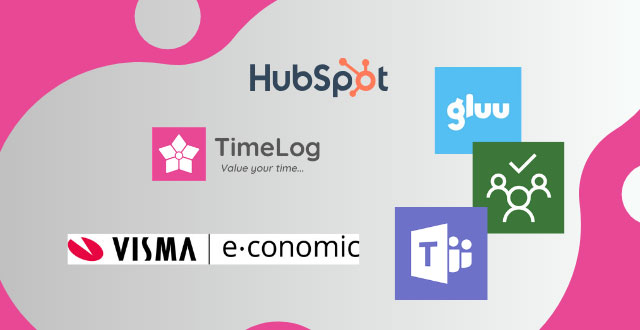Simplify the administration of resource loans between companies
4 min read
Time tracking
Build your perfect data foundation for spotless invoicing and deep business insights with easy time tracking.
Project management
Be a world champion project manager. Keep your projects on track - and profitable.
Resource management
Efficiently staff projects and run a predictable business with confidence.
Insights & Reporting
Get smarter - faster - to make clever decisions for long-term growth impact.
Project accounting & Invoicing
Invoice everything - fast and accurate - while staying on top of project finances.
Staff & Salary
Give accountants and HR an intelligent tool to eliminate draining administration.
Financial Systems
TimeLog offers standard integrations for all your favourite financial systems. Save time and reduce manual tasks.
Payroll Solutions
TimeLog offers standard integrations for multiple payroll solutions. Get easy salary administration and only enter payroll information once.
Add-ons
Track time automatically via Outlook, use gamification or find another add-on that can support your business.
Multiple Legal Entities
You can create synergy between your departments and across borders and offices with the Multiple Legal Entities module from TimeLog.
Business Intelligence
Utilise the insights you get from TimeLog to the fullest. Our system is ready to integrate with multiple BI solutions.
Partner Integrations
TimeLog PSA is part of a large ecosystem. Get an overview of all the partner integrations in the TimeLog family.
Economy department
Save 1-2 days a month on your invoicing process.
Project teams
From planning to execution and evaluation. Robust tools for every project manager.
Management teams
Create a performance-driven culture with solid reporting capabilities.
Large enterprises
Enhance operations and performance across entities, countries and departments.
NGOs and non-profit organisations
Simplify internal processes, spend less time on administration, and get documentation in place - at a discounted rate.
Blog
Get inspired to run an even better business with articles, guides and analyses.
Guides, podcasts and webinars
Get access to templates, guides and webinars that help and inspire you.
Help Center
Looking for help material and user guides to the TimeLog system? Look no further. Find all the help you need now.
Get a single source of truth
Discover how companies maintain a single source of truth across borders, departments, and currencies.
Get integrated
Discover the advantages customers gain from utilising our integrations and API.
Reporting in real-time
Explore how others leverage reporting to optimise their processes and make informed decisions.
Get started with resource planning
Discover how other companies thoroughly grasp their resources and enhance their ability to predict future trends.
Improved project financials
This is how the efficient financial toolbox from TimeLog helps project managers and CFOs improve their project financials.
Faster invoicing
Discover how other companies have slashed the time spent on invoicing by 75% - and uncover how you can achieve the same efficiency.
The Story of TimeLog
Get insights on TimeLog and how we can help you grow and evolve your business.
Employees
See who shows up every day to deliver the best PSA solution.
Career
What's life like at TimeLog? Are we hiring? Get the answer here.
Partner
Create even more value for your customers, as well as ours, as a TimeLog Partner.
Premium Service
Online Help Center, tailored onboarding and support from Day 1.
Corporate Social Responsibility
We work to ensure a positive impact on planet, people and businesses.
Security and GDPR
Learn more about how we work to keep your data safe and provide maximum security.
5 min read
When defining your company's growth strategy, including your internal processes and KPIs, to secure a healthy and growing business is crucial.

"To finish first, first you have to finish."
Walk among the mechanics at the traditional 24-hour Le Mans endurance race, and you will hear this line repeatedly.
The history pages of this legendary track are crowded with fast cars that outpace everyone until something goes wrong, and they burst into flames. Or end their race behind closed garage doors with mechanical failure.
In 2000, the racing world was baffled as Audi claimed all three podium spots. The highly skilled mechanics had to change the car's rear end to get there.
You might also like The 7 financial KPIs you need to know as a professional services business leader.
A process that would take any other team hours to finish, Audi's top-trained mechanics executed in less than 4 minutes.
Since their first win, they have won 12 times, making them the second-most-winning team at Le Mans.
But what does Audi's motorsport history have to do with growth strategy, KPIs and processes?
If you are not into motorsport, bear with me. I will get to the point.
Audi's Le Means history teaches us that you can focus on making as much money as quickly as possible.
Maximum growth in minimal time.
But if you want your company to be a top professional organisation that doesn't just win once but keeps winning repeatedly, you must get your processes and KPIs right.
Audi had built a blisteringly fast car.
Even more crucial, they optimised their internal processes and ensured all the mechanics knew them by heart. The processes allowed them to change a critical gearbox faster than anybody else would have been able to.
This allowed Audi to react proactively to what would have been a catastrophe for any other team. And win the race while they did so.
Because the entire team knows all the team's processes, they have taken the trophy 12 times since then. And because they make key figure measurements on processes and continuously optimise them, no team has even been close to catching up with them since.
If you want your company to win in the long run, you must form a similar growth strategy. This is what separates professionals from amateurs.
Let's see how processes and critical figures can help you do this.
Many years in leadership have taught me one thing:
Never gamble on anything new if you don't know your baseline.
If you don't know every corner of your machine and aren't familiar with how each part performs, you shouldn't head for new markets or make expensive technological investments in your growth strategy.
Why?
Because you want to be able to control and redirect your company according to the challenges you constantly face in new business adventures.
The tools enabling you to control your company are KPIs and processes.
The KPIs are your sensors. They show you your company's performance. Like Audi's telemetry on their racecar, they let you see where the bolts have rattled loose and where the machine runs smoothly.
I have visibly placed our most essential KPIs in TimeLog's offices. Then, the employees and I can see where we perform and where we need to improve.
The processes are your guarantee for repeating and optimising whenever your KPIs are in the green. And know how you can tune your company machine if it dives into yellow.
If you have yellow or red key figures, climbing into the engine room and identifying the broken parts is crucial. And that your team can change that gearbox within minutes.
The processes give you confidence that green KPIs are not just symptoms of luck. But they are representations of something you can repeat over and over again.
Properly tuned KPIs and processes allow you to scale your business in your growth strategy.
In start-ups, stagnating or struggling companies, it's the burden of the leadership to infuse optimism into the organisation.
An organisation that doesn't believe in itself can never be expected to deliver better results.
In most cases, new salespeople are brought in to create a turnaround and fill the order book. Subsequently, the optimism rises as new orders come in.
But optimism is quickly replaced by frustration for you, your employees, and your customers when you can't deliver what you sell.
If the rest of your company's processes can't keep up with your sales efforts, you quickly work your machine beyond capacity.
I know leaders who run their employees 70 hours a week, desperately attempting to scale the mountain of work in front of them and catch up on overly optimistic deadlines. After some time, the employees break, and the unstable situation is visible to both themselves and their customers.
Alternatively, if you run a company where you know your delivery processes and have tuned them to perfection, you also know precisely what and how much your organisation can deliver.
Not just in a single manic sprint but over and over again.
This predictability will be apparent to customers when your sales consultants present a properly formulated delivery plan. They can then close the deal with the assurance that the organisation will deliver.
In TimeLog, we have spent the past year working intensely to optimise our delivery processes, and we will continue to do so in the future.
Because of this, we can now deliver complete and transparent delivery plans to our largest and most process-demanding customers.
If you do business with large organisations, this becomes a sales argument in itself.
Most growth companies outgrow their mechanisms. They make a lot of money and have fun doing it. But when they reach a critical size, the boat starts to take in water.
The flexibility of the early days suddenly becomes a conflict between your employees when they can't rely on clearly formulated processes.
Because their KPI framework is not in place, they don't see the danger signs; instead, they keep their foot on the gas because nobody knows what is happening in the organisation.
Then, two or three of their biggest customers terminate their contracts, and the alarms go off. But then, it is often too late.
Companies quickly learn this in industries with a narrow profit margin. But this can continue for companies thriving in a favourable market.
Even in companies that have grown tremendously in size, this ignorance lingers in the stock market.
But then the market shifts, and they have no clue what to do. Often, this leads to a frenzy of new hires and layoffs without identifying the root cause for the lack of performance.
Meanwhile, the competitors have honed their delivery process and found a cost base matching the market.
And they walk away with all the buyers.
In start-ups, colleagues and leadership sit close together. Everyone is continuously aware of precisely what's happening within the company.
This gives start-ups flexibility and readiness, which you probably envy if you work in leadership in a large organisation.
But you can incorporate this in your company, despite your size.
If you incorporate carefully thought-out KPIs from your junior consultants to the board, your sensors are in place. Then, you can detect signs of a shift in the market long before it becomes a catastrophe and your customers leave.
Audi could see the weakness of the gearbox in the telemetry long before it broke.
If your organisation are in control of its processes and everybody knows them by heart, you can react to KPIs because you can identify the problems in the organisation. You know there are process owners; you can initiate corrective actions, and rest assured they will be carried out.
Audi's mechanics could change the gearbox in less than four minutes, and the drivers could keep racing.
If you base your growth strategy on these principles, you prime your company to act with agility in the market even when you have multiplied your staff headcount.
Following Audi's first victory, demands and rules have changed several times. New technologies have been introduced, and strong competitors have challenged the German team.
However, because the team is on top of its measurements and processes, it has been one step ahead of the game and always ahead of the competitors.
If you use the same principles in your growth strategy, you will reach your targets year after year.
 Read more
Read more
 Read more
Read more
 Read more
Read more
![[Guide] How to avoid buying unnecessary software for your company](https://timelog.com/hubfs/Imported_Blog_Media/blog-overview-pic-1.png)
14 min read

1 min read